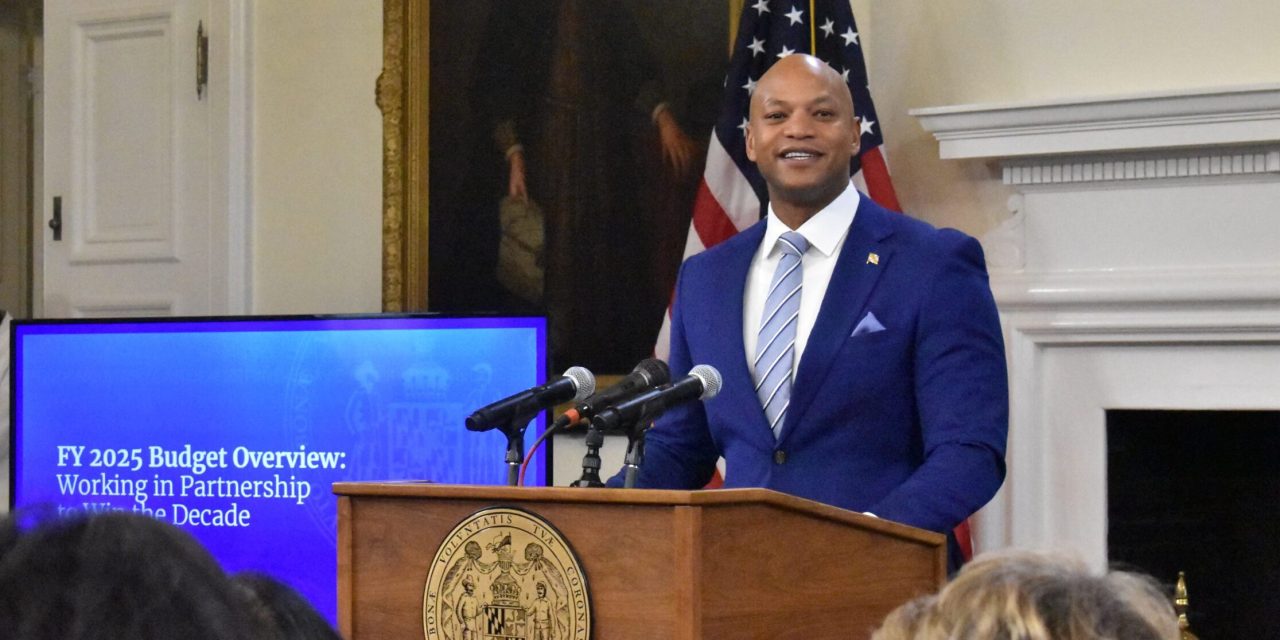By KIERSTEN HACKER
Capital News Service
ANNAPOLIS, Md. — Gov. Wes Moore unveiled a budget proposal on Wednesday that would balance the books and protect the state’s ambitious reform plan for Maryland public schools, without raising taxes in the fiscal year that begins in July.
The $63.1 billion plan would balance the books where officials had projected a shortfall, in part by returning some programs to spending levels closer to those of the pre-pandemic era. The plan also proposes leveraging state debt and dipping into rainy day funds.
The Blueprint for Maryland’s Future, the state’s sweeping education plan of 2021, will be fully funded, state budget officials said Wednesday. Moore, a Democrat, said his administration crafted the budget plan in partnership with lawmakers, community leaders and other “village elders.”
“We wanted to make sure that this proposed budget had everyone’s fingerprints on it,” Moore said in his public announcement of the new plan. “Because this budget is not just a reflection of an administration. This budget is a reflection of our shared aspiration.”
Those aspirations will now go to the Maryland General Assembly for debate. Lawmakers have set a target of early April for passing a budget, and the state Constitution requires that it be balanced.
But the joint Republican Caucus will look closely at where funding transfers in the proposed budget are coming from, House Minority Leader Jason Buckel, R-Allegany, told Capital News Service.
While he said he is pleased that the Moore administration kept total spending similar to that of years past, he expressed concerns about the possibility of fees for certain businesses or tax hikes down the road. Buckel said he’ll keep worrying about that possibility until the legislature adjourns.
“All in all, it’s a mixed bag, I think, and we’ll look forward to working with the governor and working with the Democratic leadership here to try to make the budget as good as possible,” Buckel said.
Senate Minority Leader Stephen Hershey also suggested he worries about the possibility of fee increases down the road.
“While it is a relief that the governor’s budget spends less than last year and does not raise taxes, the number of fee increases proposed by his administration through legislation and the regulatory process is concerning,” said Hershey, a Republican representing Kent, Cecil, Queen Anne’s and Caroline, in an email release. He and other Republicans contend fee hikes are coming through the administrative pipeline.
“Taxes aren’t the only way to raise revenue,” Hershey said, “and state government should not be in the business of nickel and diming Maryland’s families and small businesses.”
The only fee increases currently in the budget plan are in the Department of the Environment, and those would generate roughly $3.5 million in revenue, according to a spokesman for the governor’s office.
Working together to approve a balanced budget had been shaping up as no easy task. The state’s spending had been projected to outpace revenues starting in the coming fiscal year, according to a recent report from the Department of Legislative Services.
But Moore has now proposed a plan that would instead balance the 2025 budget, saying it is also a step in the right direction toward addressing the state’s structural deficit in the years beyond that.
His budget flips the expected cash shortfall of $1.1 billion to a positive cash balance of $103 million in fiscal 2025, according to Helene Grady, Maryland’s secretary of budget and management.
Moore said his budget prioritizes public safety, affordable housing, child care, education and public service. It also raises pay for state employees.
“We know that budgets, they’re moral documents,” Moore said. “Where we choose to invest actually defines our values. And it dictates the course of our future.”
State budget officials said they avoided wide-ranging cuts across the board, hiring freezes or salary freezes. Rather, state agency heads went through an intense process and found areas to trim, and several agency budgets will be lower this year than they were the year before.
Moore said he proposed a record $127 million for local police agencies, citing the importance of supporting law enforcement and getting “more boots on the ground” to solve crimes and keep repeat offenders off the streets. Other investments would go toward the prevention of gun violence and support for crime victims.
While addressing public safety, Moore acknowledged the debates about juvenile justice likely to come during the legislative session, announcing an increase in funding to the Department of Juvenile Services. He didn’t specifically discuss any cuts made to DJS programs.
Affordable housing and child care would also receive significant funding under the proposal. Those are two areas Moore claimed are the biggest strains on Maryland residents. Access to housing and child care allow for increased participation in the workforce as Maryland tries to grow its economy, he argued.
“Access to child care doesn’t just affect your child and your family,” Moore said. “It changes the trajectory of our state’s fiscal health.”
Options for job training in innovative industries and public service were also a priority. Through Moore’s budget, the state is on track to increase the number of Service Year Option and Maryland Corps participants to 500, as required by law.
The Blueprint for Maryland’s Future will be fully funded in the coming fiscal year, budget officials said, but its money problems are far from resolved. Prior to the beginning of the legislative session, the DLS report projected the state would exhaust the Blueprint balance in fiscal 2027.
“It’s not inaccurate to say, ‘Hey, we funded the blueprint, or at least the state’s portion of the blueprint, for today,’” Buckel said. “But I also think it’s completely honest to say the blueprint looming large over the next four or five years, blows billion-dollar holes into our state budget.”




Recent Comments